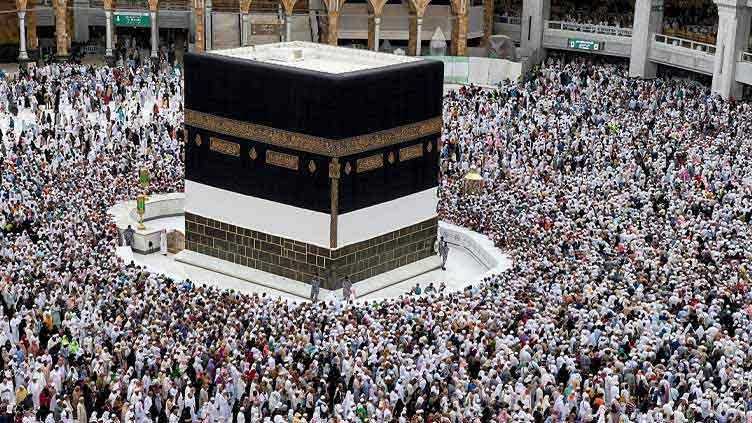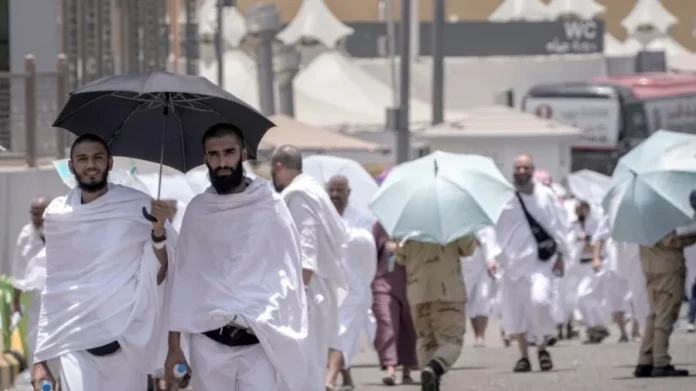Saudi Arabia Issues New Health Advisory for Hajj 2025
Underscoring its ongoing commitment to ensuring the safety and well-being of the millions of pilgrims who will travel to Mecca, the Kingdom of Saudi Arabia has issued a comprehensive new health advisory for the upcoming Hajj pilgrimage in 2025. As one of the world’s biggest strict social affairs, Hajj presents extraordinary general wellbeing challenges.
Saudi Arabia’s efforts to safeguard pilgrims from evolving health risks are highlighted in the new advisory, which reflects the most recent advancements in global health protocols.

Background: Hajj Health Protocols’
Importance Hajj is one of Islam’s Five Pillars and a religious obligation that all Muslims who can physically and financially make the journey must fulfill. Over two million Muslims from all over the world travel to Mecca each year, resulting in an environment that is unlike any other in terms of density and diversity.
This combination of individuals from different social foundations, geographic areas, and medical issue presents huge difficulties in overseeing general wellbeing. To address emerging threats like infectious diseases, heat-related illnesses, and other health risks associated with large gatherings, Saudi Arabia has consistently updated its health protocols over the years. The 2025 health advisory continues this tradition by incorporating new global health trends in addition to the lessons learned from previous years.
Key Components of the 2025 Health Advisory
The Key Features of the Health Advisory for 2025 The 2025 health advisory is a multifaceted document that addresses a variety of health issues, including emergency response procedures and preventative measures. The vital parts of the warning include:
1. Prescriptions for Vaccination
The strict vaccination requirements for all pilgrims are one of the main pillars of the health advisory for 2025. Considering ongoing worldwide wellbeing challenges, including the waiting impacts of the Coronavirus pandemic and arising irresistible sicknesses, Saudi Arabia has made it required for all pioneers to be inoculated against a scope of infections. These are some:
COVID-19: A vaccine that has been approved by the World Health Organization (WHO) must be used to fully immunize all pilgrims against COVID-19. Evidence of immunization will be expected as a component of the visa application process.
Meningococcal Meningitis: Given the high gamble of transmission in packed settings, immunization against meningococcal meningitis is required. The WHO’s recommendations for large gatherings are in line with this requirement.
Seasonal Influenza: Influenza is still a big problem, especially around big gatherings. Explorers are expected to get the occasional influenza antibody before their takeoff.
Poliomyelitis: Pilgrims from countries where polio is still a problem must get vaccinated against the disease. Not only are these vaccination requirements meant to safeguard individual pilgrims, but they also aim to stop the spread of infectious diseases throughout the Muslim world.
2. Pre-Travel Wellbeing Evaluations
The advisory emphasizes the significance of pre-travel health assessments in addition to vaccinations. Before setting out on their journey, pilgrims are strongly encouraged to undergo a comprehensive health examination. This evaluation ought to include:
Persistent Illness The board: Travelers with constant circumstances like diabetes, hypertension, or coronary illness ought to guarantee that their circumstances are all around controlled. The advisory suggests that they prepare a strategy for managing their condition during the pilgrimage and bring enough medication to last them the entire time they are there.
Fitness for Travel: Because the Hajj requires a lot of physical exertion, people should check their fitness levels and see a doctor if they have any questions. During the pilgrimage, additional assistance may be required for elderly or mobility-impaired pilgrims.
Mental Health: The advisory also includes suggestions for managing mental health because it recognizes the stress that can accompany the Hajj journey. If a pilgrim experiences anxiety or other mental health issues, they are encouraged to seek assistance.
3. Monitoring and surveillance of health
Saudi Arabia has laid out a powerful wellbeing reconnaissance framework to screen and answer any medical problems that might emerge during Hajj. The 2025 warning diagrams the accompanying measures:
Health Checks at Entry Points: All pilgrims who arrive in Saudi Arabia will have their health checked. Temperature measurements, evaluation of symptoms, and confirmation of vaccination status are all part of this. Any individual who exhibits symptoms of illness will be evaluated further and, if necessary, placed in isolation.
On location Clinical Offices: The warning subtleties the extension of clinical offices in key areas, including Mecca, Medina, and the different journey destinations. Healthcare professionals who have received training to deal with a wide range of medical emergencies will work in these facilities.
Mobile Health Units: Saudi Arabia will deploy mobile health units with the necessary personnel and medical supplies to ensure that pilgrims have access to treatment throughout the pilgrimage. Along pilgrimage routes, these units will be strategically positioned.
Health Monitoring App: The advisory introduces a health monitoring app that pilgrims can use to track their health status, get important health alerts, and get to medical services. This is a step toward digital health. The application will likewise work with contact following in case of a flare-up.
4. Prevention of Heat-Related Illnesses
Given the outrageous temperatures frequently experienced during Hajj, the warning puts critical accentuation on forestalling heat-related diseases. Some important suggestions are:
Hydration: Pilgrims should drink a lot of water and stay away from drinks with sugar or caffeine, which can make them feel thirsty.
Breaks for Rest: The advisory advises pilgrims to take frequent breaks, especially during the hottest parts of the day. Along the routes taken by pilgrims, shaded rest areas will be provided.
Wearing Light, Loose-Fitting Clothing: Pilgrims are advised to use umbrellas or other sun protection to protect themselves from direct sunlight.
Awareness Campaigns: Saudi Arabia will hold awareness campaigns to inform pilgrims about the warning signs of heat-related illnesses like heat stroke and heat exhaustion and the urgency of seeking medical attention right away.
5. Water and food safety
One important part of the health advisory is making sure that food and water are safe. The 2025 rules include:
Safe Food Dealing with: The warning underlines the significance of devouring food from legitimate sources. To prevent foodborne illnesses, street vendors are subjected to stringent health inspections.
Quality of the Water: Saudi Arabia has taken steps to ensure that pilgrimage sites’ water complies with international safety standards. To avoid water-borne illnesses, pilgrims are encouraged to consume bottled or treated water.
Saudi Arabia Issues New Health Advisory for Hajj 2025 Pilgrims are urged to maintain good personal hygiene, which includes washing their hands frequently with soap and water, particularly before eating.
Conclusion
Pilgrim Health from a Holistic Perspective Saudi Arabia’s holistic approach to managing the health and safety of Hajj pilgrims is reflected in the health advisory for 2025. By tending to an extensive variety of wellbeing concerns — from irresistible sicknesses to warm related diseases — the Realm plans to establish a climate where explorers can zero in on their otherworldly excursion without excessive stress over their wellbeing.
Saudi Arabia’s commitment to maintaining Hajj as a safe and sacred experience for all who undertake it is demonstrated by this comprehensive plan, which integrates preventative measures, health surveillance, and emergency response.
The 2025 Hajj health advisory serves as a model for how large-scale religious gatherings can be managed to prioritize the well-being of participants as the world continues to face new health challenges. The Kingdom is working not only to protect the present but also to prepare for the future, ensuring that Hajj will continue to be a spiritually rewarding and safe pilgrimage for future generations.



